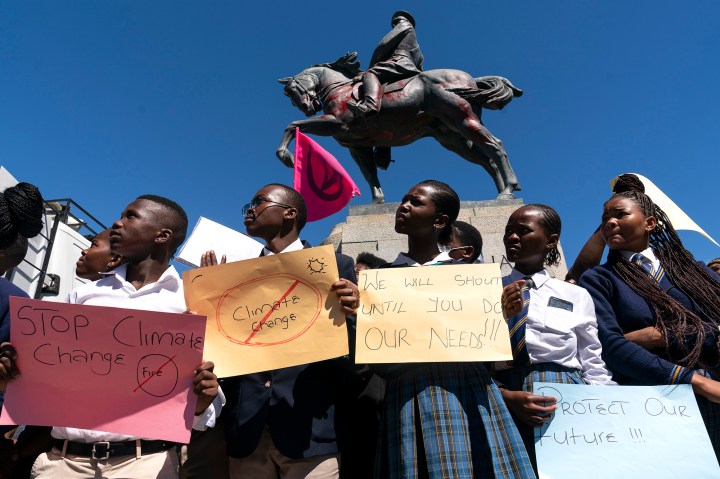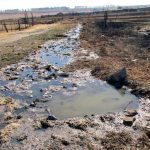CARBON SUPERHIGHWAY TO HELL
SA’s public and private sectors ‘need to be on the same climate action page’ to stave off catastrophe – activists

The latest IPCC report emphasised the urgency with which individuals, nations and corporations need to consolidate on climate crisis action to ensure that the planet does not reach a tipping point sooner than expected. Organisations say a united perspective on climate action in South Africa is needed.
South Africa’s government, big business and civil society are moving towards different climate action goals, say organisations in light of the new Intergovernmental Panel on Climate Change (IPCC) report released earlier this week.
The IPCC’s Synthesis Report of the sixth Assessment Report (AR6), found that the world needs to act with more urgency than was previously flagged to avoid the severe impacts of the climate crisis. The report said existing finances need to be redirected towards transitioning the globe to greener solutions to achieve decarbonisation that won’t lead to uninhabitable living conditions for people and biodiversity.
Read more in Daily Maverick: The need for action on the climate crisis is more urgent than previously assessed – IPCC
“The report, released [on Monday], brings together the work of leading global scientists over the past six years and clearly shows that more than a century of burning fossil fuels and unsustainable energy and land use worldwide, but in particular in developed countries, has led to global warming of 1.1°C since the start of the Industrial Revolution,” said the minister of forestry, fisheries and the environment, Barbara Creecy, in a statement.
South Africa and other African countries have been victims of a changed climate as seen through more frequent droughts and extreme heat and rainfall that has resulted in intense flooding.
A recent example was seen in parts of South Africa, Zimbabwe, Mozambique and Malawi with Cyclone Freddy, which caused death and destruction.
Read more in Daily Maverick: Cyclone Freddy’s deadly trail of destruction a grim reminder of the need to prioritise climate adaptation
“In South Africa, natural disasters such as the recent drought in the Free State, Northern Cape, Eastern Cape, and last year’s KZN floods are happening more frequently and getting worse.
‘We will be poorer and sicker’
“Climate change is making everything cost more. We will be poorer, sicker and our lives will be more uncertain,” said Liz McDaid, the head of strategy at The Green Connection.
South Africa has been selected as a leading developing nation partner to developed nations seeking to fund the Global South’s just energy transition towards renewable energy reliance and achieving their decarbonisation agenda.
South Africa received about R1.5-billion in mixed funding towards its just energy transition, but the country needs approximately R1.5-trillion to achieve its decarbonisation and green transition agendas across the energy, electric vehicle and hydrogen sectors.
Read more in Daily Maverick: Funding a greener future – Ramaphosa outlines South Africa’s R1.5 trillion three-step energy transition plan
The country’s funding shortfall is a small example of what the report referred to when it said 3.6 times the current climate investment is needed to rapidly reduce global emissions.
Robyn Hugo, the director of climate change engagement at Just Share, said inadequate climate funding goes against the commitments made in the 2015 Paris Agreement that saw countries pledging steps towards decarbonising.
Read more in Daily Maverick: Don’t underestimate local leverage for closing the funding gap for climate change in SA, says author Adam Tooze
“Capital in many countries — including our own — is being directed towards high-emitting, unsustainable sectors like fossil fuels. In South Africa, this action is often justified by reliance on the false narrative that fossil fuels will bring economic prosperity and alleviate poverty.
“This claim is presented repeatedly to delay and weaken climate-related regulation, such as the Climate Change Bill and the Carbon Tax Act,” said Hugo, adding that the strategy was used to shift the focus from the just transition, towards what stands to be lost.
As the conversation around the just transition intensifies, many in the fossil fuel industry and those with jobs adjacent to the sector have raised concerns about being left behind. The Presidential Climate Commission’s Just Energy Transition Framework has been a stepping stone towards ensuring that no one is left behind and that different stakeholders are consulted in the process of the transition.
Financing for adaptation
Beyond South Africa’s energy transition has been the question of how adaptation can be funded when much of climate financing has centred around mitigation efforts, as adaptation efforts often have minimal investment returns as compared to mitigation.
The adaptation funding gap — as well as the just energy transition one — leaves much room for South Africa’s public and private sectors to engage meaningfully to ensure South Africans can survive a challenging climate.
Chris Trisos, a South African IPCC author said: “It’s as if we are travelling on a dangerous carbon-intensive superhighway, and we are in the fast lane.
“Unless we immediately hit the brakes on carbon emissions by rapidly reducing the use of fossil fuels, we will zoom past the exit of 1.5°C of warming. One point five degrees is a much more dangerous neighbourhood than we live in right now…
“As we leave it later, and take hotter and hotter exits on the carbon superhighway, the fewer options we have to thrive.” DM/OBP





















 Become an Insider
Become an Insider
So SA needs to spend $$$ we do not have .
Meanwhile China , after breaking the Paris agreement is set to build 100 new power stations in the next 5-10 years , as a ‘developing nation’ .
It already pumps out more CO2 that the rest of the world combined .
And Escom needs exemptions to pollute even more .
Unless China joins the party , things will just carry on as usual .